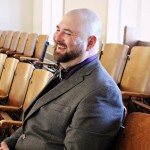Profiles in Recovery

James Tower
Tower’s calling as a Quaker pastor emerged from the depths of heroin addiction. The former atheist wrestled with poverty, violence and drugs in his youth — and nearly died of a heroin overdose in the summer of 2000. Semi-conscious and gasping for air, Tower prayed for salvation and a second chance at life.
He immersed himself in recovery and began a serious spiritual quest — eventually earning a Master of Divinity (M.Div.) degree from an Oregon seminary. Tower strengthened his sobriety by attending multiple 12-step programs, including the Christ-centered “Celebrate Recovery” movement. Today he lives with his family in Iowa, where he is active in campus ministry and leads a local congregation at a Quaker church.
PreviousNextDay Job:
Quaker pastor, former sheet metal worker/construction foreman
What I lost to addiction:
My sanity. Thousands upon thousands of dollars went up my arm in heroin use . . . I ended up losing the ability to have a bank account for 7 years. I would con people to get their money.
I almost lost my life many times due to nodding off while driving, and one fairly serious drug overdose after dabbling in recovery.
My rock bottom:
I relapsed and overdosed . . . I could hear my friends discussing throwing my body in an alley because they didn’t want to risk being questioned at the hospital. Up until that point I had been a “stone cold” atheist with many intellectual objections to there being a God, but it was then that I prayed to Jesus to save me . . . At the time all it meant to me was I wanted a second shot at recovery, that I did not want to die in an alley. It turned out meaning more than I ever imagined.
What worked for me:
I swore I would never forget the damage and wreckage I caused and the misery and depression I felt, throwing my brain chemistry out of balance for the first 18 months of recovery. The dope dreams every night where I woke up and ran to the bathroom to vomit. The times I would be driving, thinking about just hitting a tree to get all the misery over with.
I had to take a deep look at my inability to want the right things. I knew I shouldn’t be alone. I needed to start putting myself in a position to grow, to build relationships, to learn to trust in God, and to keep growing spiritually. Sometimes I had to grit my teeth to just make it to another day, and make myself see the little bits of growth in my life, however small.
Favorite recovery quote:
“When your pain outweighs your fear, change is possible.”
Rules I live by:
Love God, yourself, and others. Put your own oxygen mask on before helping others. Strive for a simple life. Put boundaries in place so that your life really reflects your true values. Be a person of integrity — this means you strive to really know yourself, are true to yourself, and are the same person in front of others as you are at home in the dark.
When cravings come:
If all you think about is cravings, it will only make them stronger. You can’t just take something away, you have to fill the hole it leaves with something good.
Pray. Hang out with a friend. Learn a new skill. Be grateful for something. Make your own fun. Get fired up about something good!
On finding purpose:
I never dreamed I would earn a master’s degree, lead a congregation, teach college students, or have articles published in a magazine. I believe the same things (like obsession, compulsion, drivenness) that make someone an addict can also make someone an Olympic athlete, or a straight A student, or even cure cancer. The only difference is that these more successful people have found a healthy way to channel their self- destructive forces into something valuable, worth sacrificing for.
Shed the Stigma:
If you’re a person in long-term recovery who wants to share your insights, please contact us at [email protected].